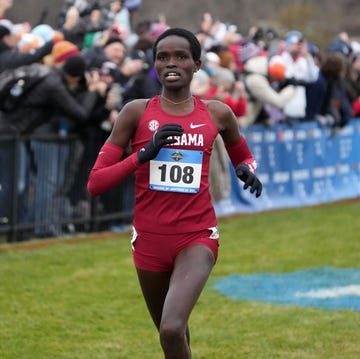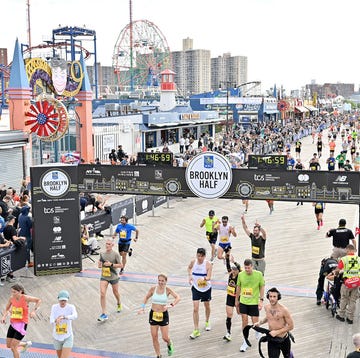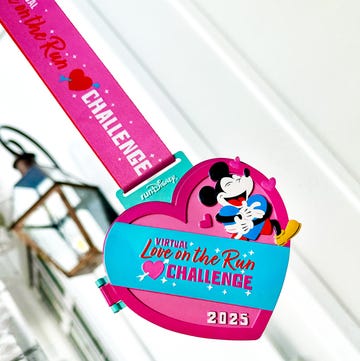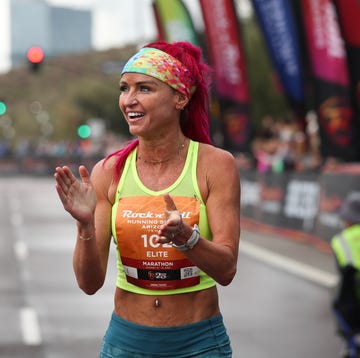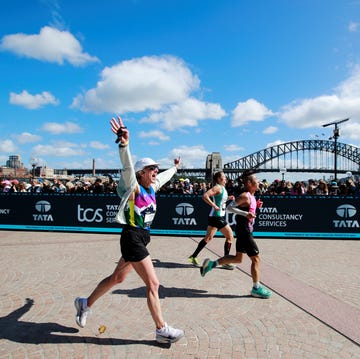Lance Armstrong was greeted by New York City Mayor Michael Bloomberg after Armstrong ran the 2007 New York City Marathon. Photo Reuters/Mike Segar
Lance Armstrong intended to run October 7’s Bank of America Chicago Marathon as a member of the team sponsored by his Livestrong Foundation, which raises funds for cancer programs. But Chicago won’t accept the banned cyclist into its field, according to Armstrong's spokesman.
“We got the news [Thursday],” said Mark Fabiani, Armstrong’s spokesman.
Virtual Races With the Best Bling last month’s ruling by the U.S. Anti-Doping Agency that Armstrong was guilty of using performance-enhancing drugs for more than a decade. The agency, which handles drug testing for U.S. Olympic sports, ruled that Armstrong was banned for life and had to forfeit cycling titles, including the seven he won in the Tour de France.
Chicago really had no choice in the matter. The USADA ruling affects all sports, not just cycling, because of the World Anti-Doping Code. The agreement, signed by USADA and U.S. Olympic sports governing bodies, includes a “mutual recognition” principle. If an athlete is banned by one sport, the ban must be recognized by the other federations which have signed the code.
“Under the rules, if an athlete is banned from competition under the World Anti-Doping Agency Code, this includes any event or competition that is sanctioned by a sport governing body which is a signatory to the Code, irrespective of the athlete’s level or expected results,” said USADA spokesperson Erin Hannan.
Though Armstrong’s violations occurred in cycling, the code prevents him from competing in other sports such as road racing and triathlon. If Chicago were to permit Armstrong entry, the event could lose its status as a USA Track & Field-sanctioned race.
The race issued a statement Friday: “The Bank of America Chicago Marathon adheres to USA Track & Field rules, which includes following the United States Anti-Doping Agency regulations, the testing agency of the marathon. USADA’s lifetime ban prohibits Lance Armstrong from entering races sanctioned by USA Track & Field, which applies to the Bank of America Chicago Marathon, as well as all competitions governed by USA Track & Field.”
The race said it has had no direct contact with Armstrong, nor had he submitted a formal registration to participate.
For USA Track & Field, it’s a cut-and-dried position. Armstrong is banned by the mutual recognition agreement even though he is not an elite marathoner who might contest for prize money in Chicago.
To many in the running community, Armstrong was nothing but a positive. The community has been waiting to see if USA Track & Field, the national governing body for the sport, would enforce the ban on Armstrong. Now we know. There likely will be no Bostons or New Yorks in Armstrong's future.
"We have read that USATF has declared Lance Armstrong ineligible to compete in USATF-sanctioned events," said Tom Grilk, executive director of the Boston Athletic Association. "As our national governing body, we will follow its guidance. Also, we will continue to monitor further developments from the agencies and governing bodies involved."
To Armstrong’s defenders, the enforcement of mutual recognition is piling on by USADA.
“USADA's unprecedented and irrational efforts to strong-arm local race organizers and prevent Lance from participating in Team Livestrong fundraising is just the latest chapter in USADA's never-ending vendetta against Lance,” said Bill Stapleton, Armstrong’s agent, in a released statement.
Said Lance Armstrong Foundation CEO and president Doug Ullman in a statement released Friday: “It's frustrating and unfortunate that this decision could affect the foundation's grassroots fundraising efforts. Team Livestrong participants raise money to fuel the Lance Armstrong Foundation's free services for cancer survivors.”
For a cyclist, Armstrong has made a big shoeprint in road running. When he hopped into a Boston or New York marathon, it was news. His Livestrong Foundation sponsors runners who have raised millions of dollars to fight cancer in races across the country. Livestrong also sponsors races.
“It seems a little over the top to pursue him beyond the cycling arena to me,” said John Conley, whose company owns and operates the Livestrong Austin Marathon and Half Marathon.
Last week Livestrong indicated that ban or not, the foundation planned to maintain its involvement in running, which includes sponsoring runners in races like Chicago and sponsoring races.
“I expect it will continue to be just as it has been,” Conley said. “I don’t expect any changes really.”




